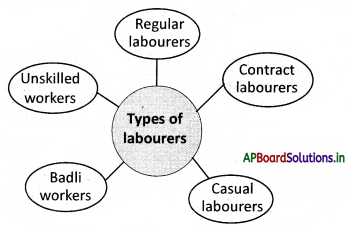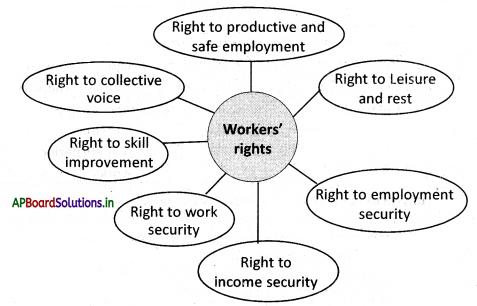Students can go through AP State Board 7th Class Social Studies Notes Chapter 19 Livelihood and Struggles of Urban Workers to understand and remember the concept easily.
AP State Board Syllabus 7th Class Social Studies Notes Chapter 19 Livelihood and Struggles of Urban Workers
→ Right to productive and safe employment; Right to Leisure and Rest; Right to Employment Security; Income Security; Work Security; Skill improvement; Collective Voice are some of the rights of the workers.
→ In most countries, the governments have agreed that these basic needs of the workers, and made laws that ensure these rights to the workers.
→ The laborer departments have the responsibility to ensure that these laws are followed. & Many registered factories in our country gave these rights only to regular workers but not to casual or contract workers.
→ There are three kinds of workers employed in a factory. They are
(a) permanent workers
(b) casual workers (Badli workers) and
(c) daily workers.
→ Trade unions help the workers to get their wages fixed to get facilities such as employees’ state insurance and Provident Fund.
→ The trade unions have secured other benefits to workers such as health check-ups in case of sickness, safety wear in the workplace, educational allowance for workers’ children, etc.
![]()
→ Most of these benefits are available only to the permanent workers but not for the casual workers and contract workers.
→ While the permanent workers enjoy higher salaries, ESI, medical Insurance, and provident fund, the casual workers get very little salary and very few benefits like Provident Fund and Health Insurance.
→ The lot of the workers in a brick kiln is very miserable. They are paid very low wages and are forced to work for 14 to 16 hours per day.
→ The owners of brick kilns gave an advance payment and forced them to work as bonded laborers until their advance is repaid.
→ The sector, in which the workers are not registered as employees, there is no agreement and no protection of law or rules and regulations are called the Informal Sector.
→ In the Informal sector, the workers do not get any regular employment and so they end up as casual workers.
→ In Informal Sector the employment is both irregular and very low-paying.
→ People are forced to do many kinds of works in a day. In most cases, all the members of their families including their children have to work.
→ Their children remain uneducated. They don’t have good food or medicines. Their life is in a vulnerable position.
→ Almost all the workers in the informal sector are heavily in debt and often have to work for them.
→ Not only because of urbanization but also of the closing down of large factories and mills, the number of casual workers is increasing day by day.
→ Compensation: Something, typically money, awarded to someone in the ignition of loses suffering, or injury.
→ Provident Fund: An amount, saved from the earning of an employee with an added contribution from the employer.
→ BadliWorker: Temporary or contract workers
→ Wages: Monetary paid by an employer to an employee in exchange for work done.
→ Workers on contract basis: People who are appointed in a company/organization, who are not permanent employees, but for fulfilling the temporary or seasonal requirement.
![]()
→ ESI: Employees’ State Insurance Permanent
→ Workers: Regular employees. They are selected directly and paid directly by the employer

